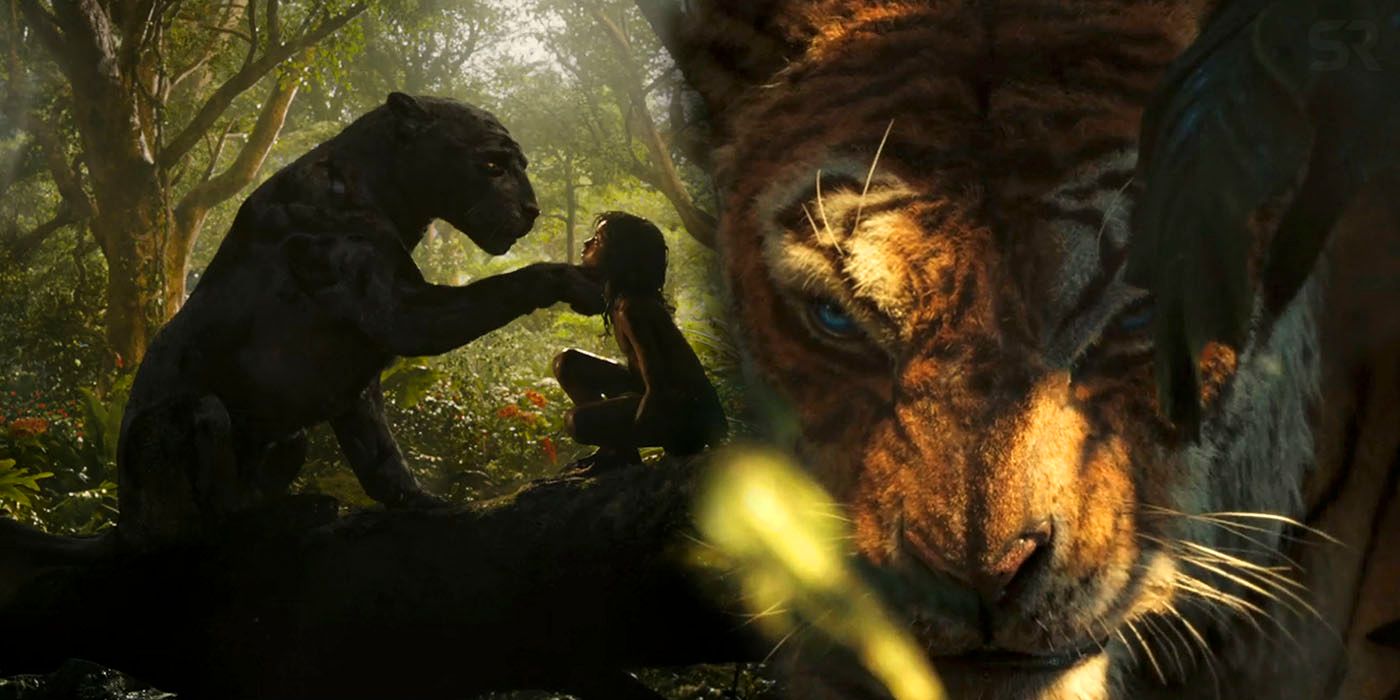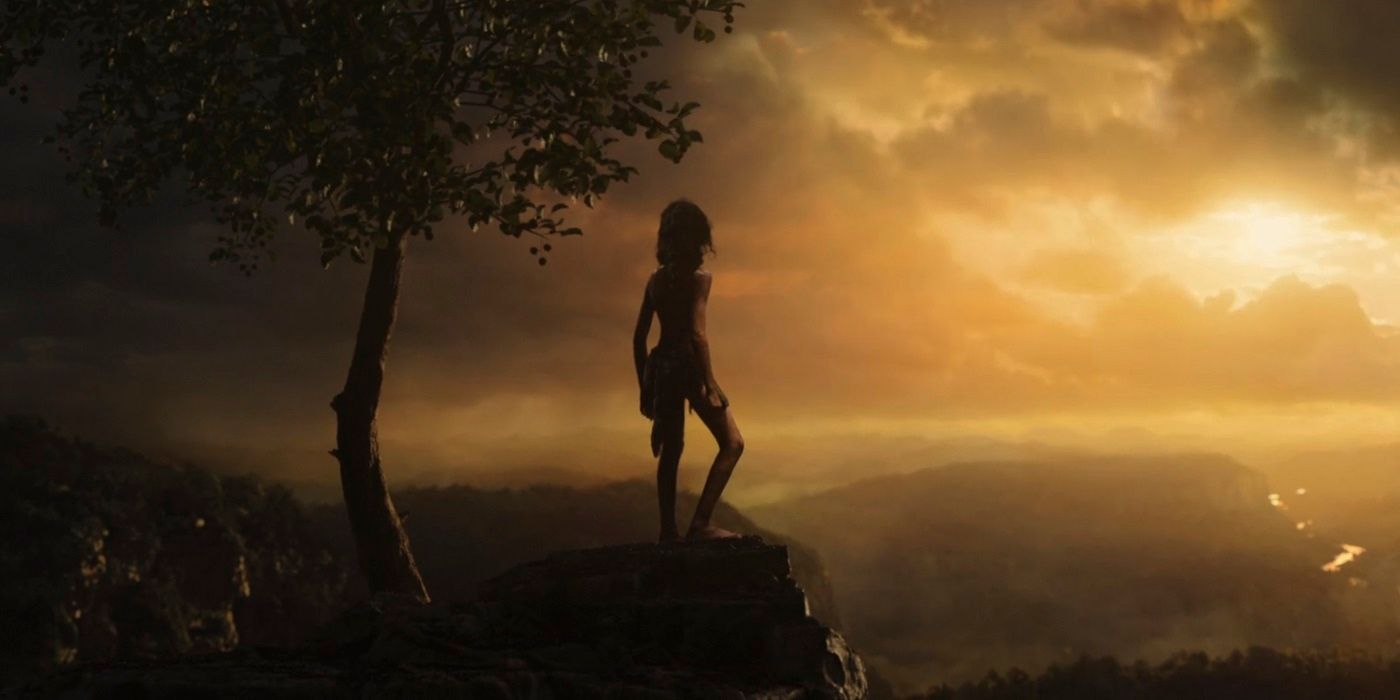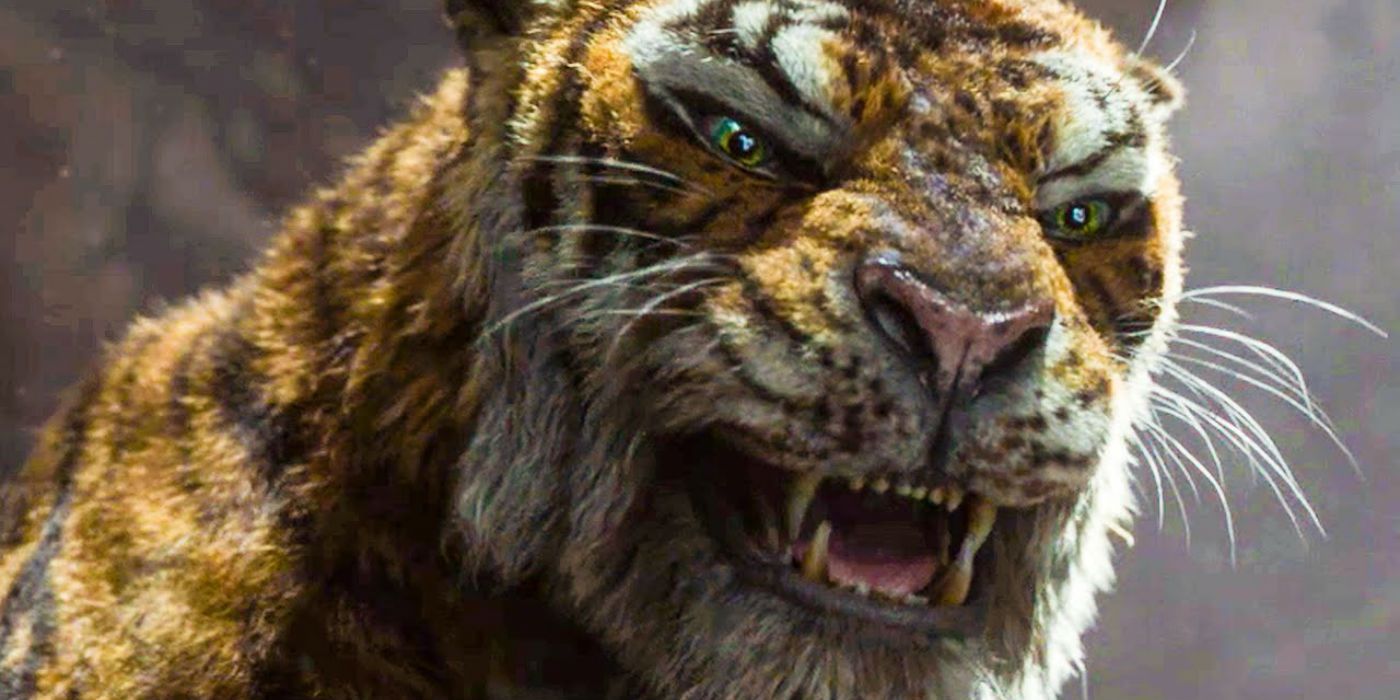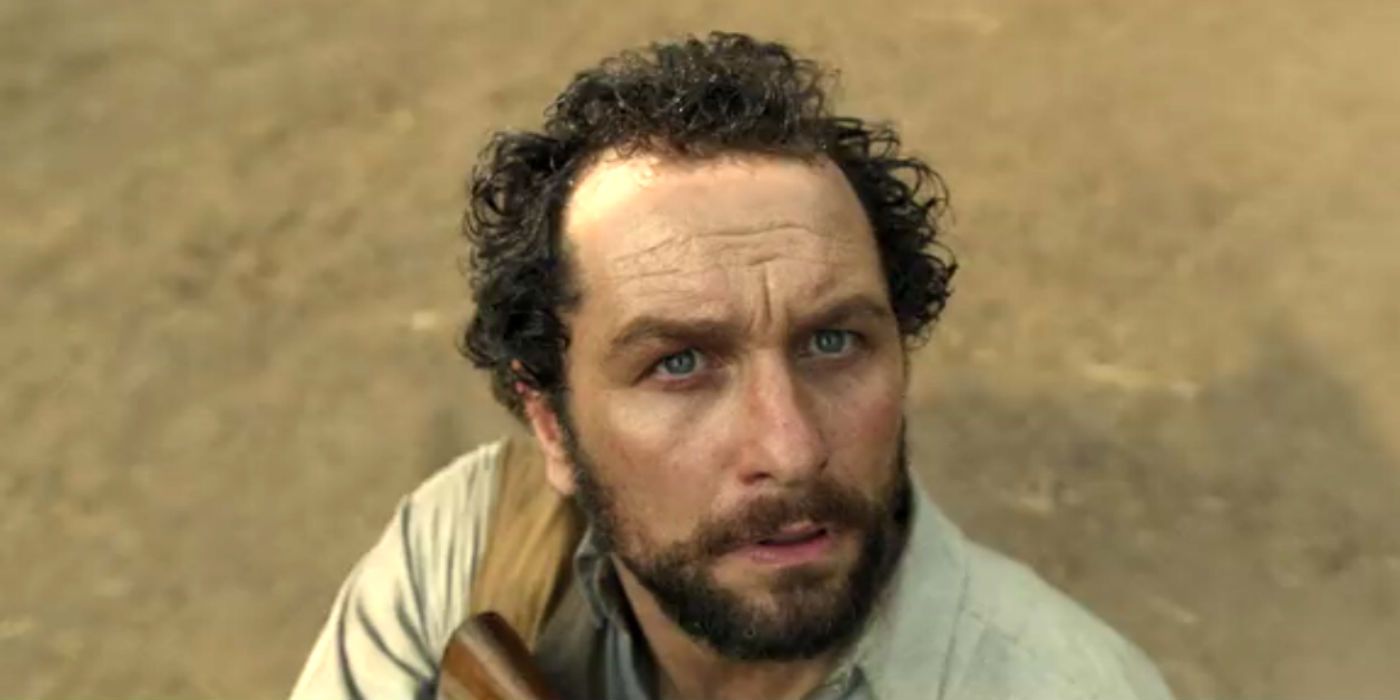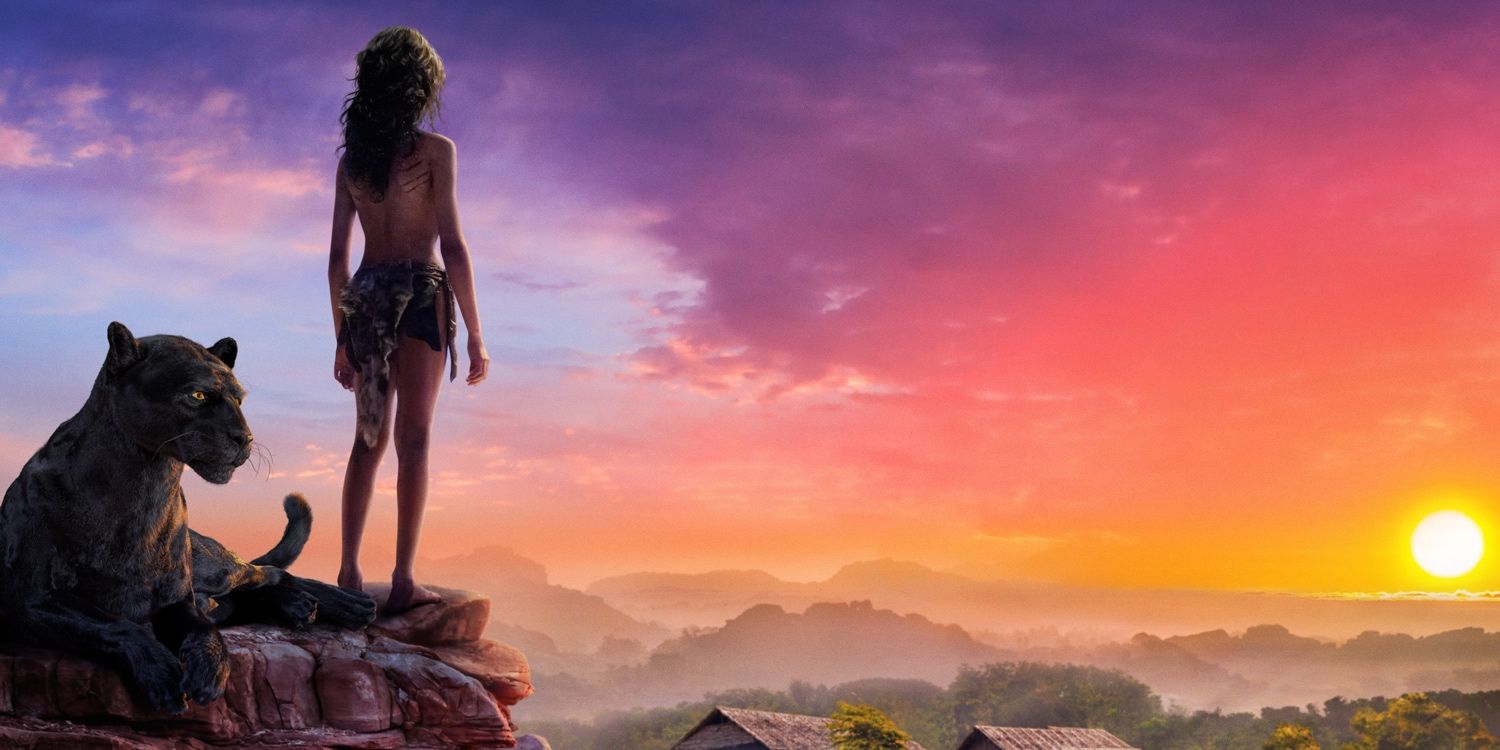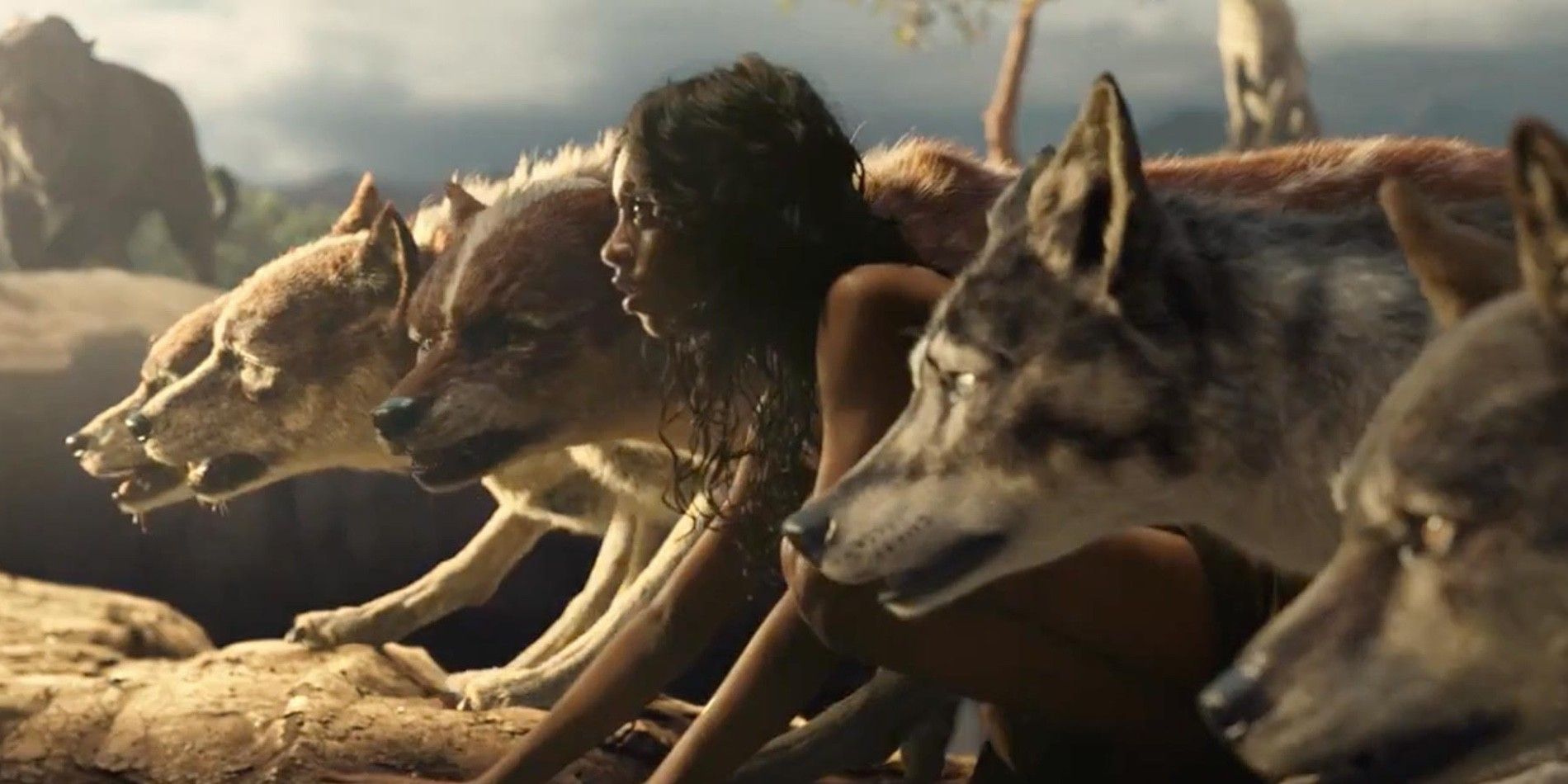Andy Serkis' Mowgli: Legend of the Jungle, takes a darker approach to the material than the Disney version - and builds to a thrilling final act. The ending of the movie sees Mowgli (Rohan Chand) finally face off against Shere Khan (Benedict Cumberbatch), the wicked tiger who killed his parents. In the final battle, trophy hunter Lockwood (Matthew Rhys) also gets a brutal comeuppance for his crimes against the jungle.
Mowgli follows many of the same beats as "Mowgli's Brothers," the original short story from Rudyard Kipling's The Jungle Book, and takes plot elements and characters from the other Mowgli stories. Many of the details in the movie - Bagheera (Christian Bale) buying Mowgli's place in the wolf pack with a water buffalo, Shere Khan's crippled paw, and Bagheera showing Mowgli the marks from where he used to wear a collar - are lifted straight from Kipling's writing. The movie also addresses Mowgli's struggle to choose between his upbringing among the wolves, and his origins among mankind.
Related: Netflix's Mowgli: Voice Cast & Character Guide
At the end of the movie, after getting a taste of life in the man village, Mowgli ultimately decides to return to the jungle - but first, he has to deal with the deadly threat of the tiger who has plagued him for his entire life.
- This Page: How Mowgli Ends & Shere Khan Is Defeated
- Page 2: Mowgli's Decision & The Ending's Real Meaning
What Happens In Mowgli's Ending
After Mowgli defends Akela (Peter Mullan) from being challenged to death by the rest of the pack using a flaming branch, he is banished for breaking the law of the jungle and runs blindly to the man village, where he is captured. Bagheera visits him in the night and reveals that he was born in captivity, and advises Mowgli to earn the villagers' trust. Sure enough, the next morning Mowgli's cage is open, and he begins to bond with Lockwood and a kindly villager called Messua (Freida Pinto). He takes a knife given to him by Lockwood, begins playing with the other children and taking part in the village's traditions, and rejects his brother wolf's pleas to return to the jungle and save the pack from Shere Khan's "leadership".
However, Mowgli's idyllic life in the man village comes to an end when he puts a drunken Lockwood to bed, and discovers the hunter's trophy room - which includes the remains of Mowgli's wolf cub friend, Bhoot (Louis Ashbourne Serkis). A traumatized Mowgli goes to kill Lockwood in the morning, but stops when he sees the hunter's scar, and instead takes the elephant tusk from the trophy room and returns it to the moss-covered elephant it came from. "I will show you the hunter who took this," Mowgli tells the elephant. "If you will help me rid the jungle of the tiger."
Related: How Netflix's Mowgli Compares To Disney's Jungle Book
Having gained the elephants' allegiance, Mowgli then returns to his former wolf pack to solicit their help in killing Shere Khan. However, Akela is stubborn in his adherence to the law of the jungle and says that he cannot intervene, and nor will any other members of the pack - Baloo (Andy Serkis) and Bagheera included. Mowgli retorts that he is no longer bound by the law of the jungle, and that he is not exactly a man or a wolf. "Tomorrow, the tiger dies," he tells Akela.
The movie concludes with Mowgli defeating and killing Shere Khan, with help from both the elephants and - ultimately - Akela, who gives his own life to save Mowgli and cripple the tiger. With his dying breath, Akela transfers leadership of the pack to Mowgli, and Mowgli chooses to leave mankind behind and return to the jungle to lead the wolf pack.
How Mowgli Defeats Shere Khan
After recruiting the elephants, and attempting to recruit the wolf pack, Mowgli goes to a field near the man village and calls out to Shere Khan, who arrives with his hyena lackey Tabaqui (Tom Hollander) close on his heels. When Shere Khan and Tabaqui are in the field, Mowgli howls to signal the elephants to come charging in. Upon seeing the elephants approaching, the cowardly Tabaqui flees, leaving Shere Khan to face Mowgli and the elephants alone. Shere Khan tries to attack Mowgli, but is bowled over by an elephant. Mowgli throws his knife at the tiger, hitting him in the shoulder and, after trying and failing to retrieve the knife, climbs up a tree to evade Shere Khan's attack.
An enraged Shere Khan tries to follow Mowgli up the tree, but ends up trapping himself in the fork of two branches - giving Mowgli an opportunity to retrieve his knife and stab the tiger in the belly. All the commotion has alerted the nearby villagers, and the fight is briefly interrupted by Lockwood taking drunken pot shots at Shere Khan. Mowgli tells the moss-covered elephant, "There's your hunter," and the elephant departs to exact its revenge. Meanwhile, the wolf pack has decided to intervene in the fight, and just as Shere Khan is about to pounce on Mowgli, Akela crashes into the tiger and sacrifices his life - dealing Shere Khan mortal wounds in the process.
Mowgli follows Shere Khan into the jungle, where he has collapsed from his wounds. As Bagheera taught him towards the start of the film, Mowgli looks his enemy in the eyes as his life fades away, so that Shere Khan will not die alone. However, after seemingly breathing his last, the tiger rears up for one last attack - and Mowgli finishes him off. "Sleep now, Shere Khan," he tells the dead tiger. "Be angry no more."
Bhoot's Death & The Jungle's Revenge on Lockwood
Easily the most shocking (and non-kid-friendly) moment in Mowgli is when our young hero discovers Lockwood's tent full of trophies, and stumbles across the decapitated head of albino cub Bhoot. The death hits particularly hard not only because of its gruesomeness, but also because of the harsh words that Mowgli slung at Bhoot during their final interaction. It isn't clear when exactly Bhoot died, but it seems as though he may have run away from Mowgli's insults and right into the path of the hunter - making Mowgli indirectly responsible for his friend's death.
Mowgli does manage to orchestrate the jungle's revenge on Lockwood, however, by taking a severed elephant tusk from the trophy room and returning it to its original owner. As Lockwood reveals when pressed by the villagers, the elephant was the only kill that he ever missed - so there's obviously unfinished business there. Lockwood misses his second kill (if his claim is to be believed) when he takes a shot at Shere Khan and misses, grazing Mowgli's arm instead. He is so focused on lining up another shot that he doesn't see the vengeful one-tusked elephant charging at him until it's too late. The last time we see Lockwood he is on the ground, still moving a little, but it's doubtful that he survived the encounter.
Page 2: Mowgli's Decision & The Ending's Real Meaning
Why Mowgli Decides To Stay In The Jungle
Despite Lockwood's house of horrors, Mowgli has many positive experiences during his time in the man village and even finds a mother figure in Messua (a character lifted from Kipling's stories, in which she became Mowgli's adoptive mother). His closeness with his wolf brothers is also reflected in him finding friendship among the village's children. After doing what Lockwood could not, and successfully killing the tiger that had been stealing cattle from the village, Mowgli would probably have been welcomed back as a hero - but instead, he chooses to stay in the jungle and become its voice.
Mowgli's decision to stay in the jungle (in Kipling's stories he eventually leaves and lives among mankind instead) seems to be primarily driven by a sense of duty to the pack, given that Akela's final wish was for him to take over as leader. The final voiceover from Kaa is somewhat ambiguous about Mowgli's ultimate fate - saying only that there was peace in the jungle for as long as Mowgli watched over it, and not that Mowgli watched over the pack until his death. It's entirely possible that Mowgli eventually decides to return to live among men, handing over leadership of the pack to one of the other wolves.
Related: Andy Serkis Interview - Mowgli: Legend of the Jungle
The Real Meaning of Mowgli's Ending
As much as Mowgli is frustrated by the law of the jungle, the end of the movie ultimately succeeds in conveying the importance of those laws, and of keeping them sacred. Both Lockwood and Shere Khan upset the balance of things by treading where they did not belong: Lockwood, by hunting the animals of the jungle for sport; and Shere Khan, by taking cattle from the man village and drawing the ire of mankind. As Kaa's final monologue explains, the death of both the hunter and the tiger meant that "the future shimmered from darkness into light," and as long as Mowgli stood watch over the jungle, there was a "lasting peace."
Throughout the movie, Mowgli struggles with his identity - unsure if he is a man or a wolf - and this internal conflict is reflected in the external conflicts of the story. Just as there is a war going on inside Mowgli, there is also a war between the man village and the jungle. Mowgli finally concludes that he is "man and wolf, both and neither," and as he makes peace with this dichotomy he is also able to end the animosity between the village and the jungle, allowing both to co-exist alongside one another.

